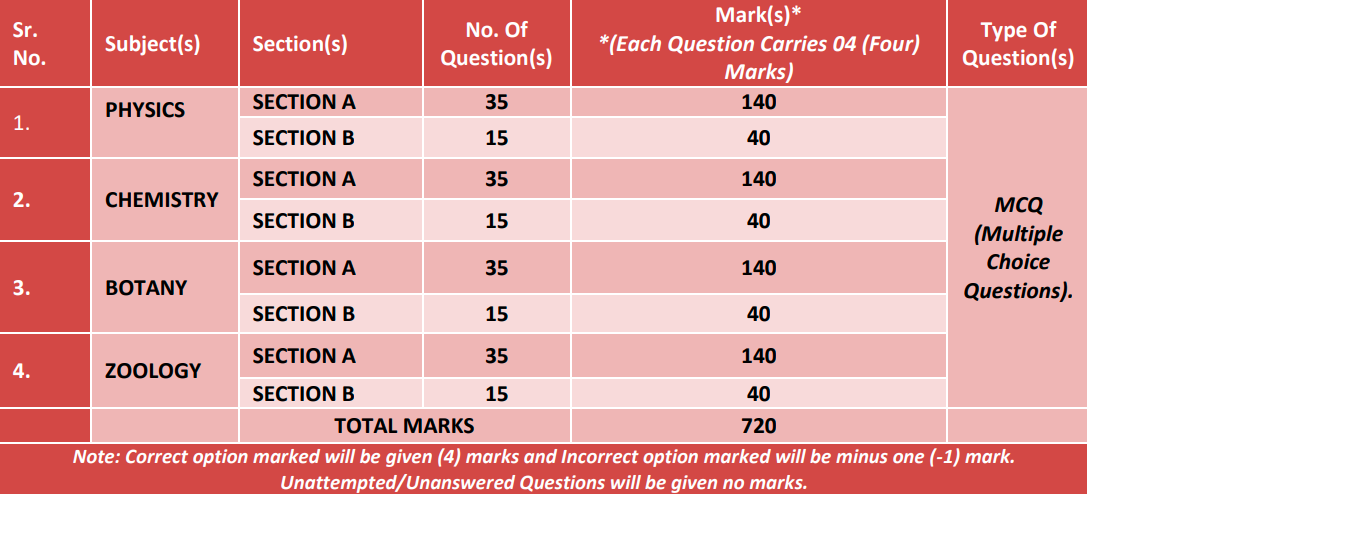NEET Syllabus 2022 Topicwise
NEET Syllabus 2022 includes topics covered in Class 11 and 12 Physics, Biology and Chemistry syllabus. National Eligibility cum Entrance Test (NEET) is a medical entrance examination conducted nationwide by the NTA (National Testing Agency) for students aspiring to pursue medical courses across medical colleges in the country. NEET 2022 question paper is formed on the basis of the syllabus specified by the MCI (Medical Council of India).
The syllabus for NEET is designed by MCI after analysing the syllabus specified by different State boards in addition to the syllabus prescribed by NCERT, CBSE, and COBSE in class 11 and 12 Physics, Chemistry, and Biology to ensure uniformity in medical education across India. Procuring familiarity with the syllabus can assure a thorough preparation of each and every topic covered in the NEET syllabus 2022.
You may like: NEET 2020 Question paper
Table of Contents for NEET Syllabus 2022 Topicwise:

Owing to the vast syllabus and fierce competitive levels, NEET is deemed as one of the toughest competitive exams. Before you start your NEET preparations, students are recommended to know and understand each topic the syllabus has to offer. The intent of NEET Syllabus is to assist NEET aspirants to comprehend the content that is to be covered. A foolproof strategy must be planned and its execution is important for cracking NEET. NEET syllabus renders a fair knowledge of allotment of marks, along with important topics to be prioritized.
Also Check: NEET Preparation Tips
NTA NEET Syllabus Subjectwise – Detailed Syllabus
The NTA (National Testing Agency) provides the syllabus for NEET under each section – Physics, Chemistry and Biology which predominantly covers the NCERT syllabus for classes 11 and 12. The table below provides links to the detailed syllabus for each subject. Click on the links to view the syllabus.
Full NEET Syllabus 2022 Topicwise
| Detailed NEET Syllabus – Subjects | Corresponding Links |
| Complete NEET Physics Syllabus | Click here |
| Complete NEET Chemistry Syllabus | Click here |
| Complete NEET Biology Syllabus | Click here |
NEET Full Syllabus 2022 PDF Download
Physics Syllabus for NEET 2022
Usually, students find the Physics section of NEET to be challenging of all given the questions involve computations and application of theoretical knowledge to answer questions. The table below provides a brief of all the chapters from class 11 and class 12 included in the NEET syllabus as per the NTA.
NEET Physics Syllabus 2022
|
Class 11th Syllabus |
Class 12th Syllabus |
|---|---|
| Physical world and measurement | Electro statistics |
| Kinematics | Current Electricity |
| Laws of Motion | Magnetic effects of Current and Magnetism |
| Work, Energy, and Power | Electromagnetic induction and alternating currents |
| Motion of systems of particles and rigid body | Electromagnetic waves |
| Gravitation | Optics |
| Properties of Bulk Matter | Dual Nature of Matter and Radiation |
| Thermodynamics | Atoms and Nuclei |
| Behavior of Perfect Gas and Kinetic theory | Electronic Devices |
| Oscillations and wave |
Chemistry Syllabus for NEET 2022
The Chemistry section of NEET is considered to be the scoring section, most questions are NCERT-based and direct in nature. Usually, the questions in NEET from chemistry are easy to understand and answer. Tabulated below is the NEET syllabus for Chemistry from class 11 and class 12.
NEET Chemistry Syllabus 2022
| Class 11th Syllabus | Class 12th Syllabus |
| Some basic concepts of Chemistry | Solid state |
| Structure of atom | Solutions |
| Classification of Elements and Periodicity in Properties | Electrochemistry |
| Chemical Bonding and Molecular structure | Chemical Kinetics |
| States of Matter: Gases and liquids | Surface Chemistry |
| Thermodynamics | General principles and Processes of Isolation of Elements |
| Equilibrium | P Block elements |
| Redox reactions | D and F block elements |
| Hydrogen | Coordination compounds |
| s-Block elements (Alkali and Alkaline earth metals) | Haloalkanes and Haloarenes |
| Some p-Block elements | Alcohols, Phenols, and Ethers |
| Organic Chemistry – Some basic principles and techniques | Aldehydes, Ketones and Carboxylic Acids |
| Hydrocarbons | Organic compounds containing Nitrogen |
| Environmental chemistry | Biomolecules, Polymers, and Chemistry in everyday life |
NEET Syllabus 2022 Biology
The Biology section of NEET comprises the most number of questions, 90 questions out of a total of 180 questions, given the vast syllabus it covers from Botany and Zoology. Since there are many chapters to cover in Biology syllabus for NEET, it is highly recommended to follow the syllabus provided in the following table while NEET preparation as prescribed by the NTA.
NEET Biology Syllabus 2022
| Class 11th Syllabus | Class 12th Syllabus |
| Diversity in the Living World | Reproduction |
| Structural organization – Plants and Animals | Genetics and Evolution |
| Cell Structure and Function | Biology and Human welfare |
| Plant Physiology | Biotechnology and its applications |
| Human physiology | Ecology and environment |
Important Topics For NEET – NEET Syllabus Analysis Chapterwise Weightage
NEET Physics Syllabus Analysis – NEET Chapterwise Weightage
NEET 2021 Question Paper Analysis – Physics
| Chapters | Questions Breakup |
| Modern Physics & Electronics | 8 |
| Magnetism | 7 |
| SHM & Wave | 3 |
| Optics | 4 |
| Electrostatics and Electricity | 11 |
| Heat & Thermodynamics | 4 |
| Mechanics | 13 |
NEET 2020 Question Paper Analysis – Physics
The table below depicts the weightage of topics in the NEET Syllabus Physics Section, provided unit-wise after analysis of NEET 2020 question paper. Take a look:
| Unit | Weightage (approximate) |
| Physical World and Measurement | 2% |
| Kinematics | 7% |
| Laws of Motion | 7% |
| Work, Energy and Power | 4% |
| System of Particles and Rotational Motion | 4.50% |
| Gravitation | 4.50% |
| Properties of Bulk Matter | 9% |
| Oscillations and Waves | 7% |
| Thermodynamics | 4.50% |
| Behaviour of Perfect Gas and Kinetic Theory | 2% |
| Electrostatics | 4% |
| Current Electricity | 9% |
| Magnetic Effects of Current and Magnetism | 7% |
| Electromagnetic Induction and Alternating Currents | 4% |
| Electromagnetic Waves | 2% |
| Optics | 4.50% |
| Dual Nature of Radiation and Matter | 4% |
| Atoms and Nuclei | 7% |
| Electronic Devices | 7% |

Also Read: NEET Physics MCQs
NEET Chemistry Syllabus Analysis – NEET Syllabus 2022 Topicwise
NEET 2021 Question Paper Analysis – Chemistry: NEET Chapterwise Weightage
| Chemistry Sections | Questions Breakup |
| Inorganic Chemistry | 19 |
| Organic Chemistry | 15 |
| Physical Chemistry | 16 |
A detailed breakup of the number of questions for each chapter of NEET Chemistry 2021 is as follows –
| Physical Chemistry | |
| Chapter | No. of Questions |
| Solid state | 2 |
| States of matter | 2 |
| Thermodynamics | 1 |
| Electrochemistry | 2 |
| Surface chemistry | 1 |
| Solutions | 2 |
| Chemical Kinetics | 2 |
| Nuclear Chemistry | 1 |
| Mole concept | 1 |
| Atomic structure | 1 |
| Ionic equilibrium | 1 |
Also see: NEET Question Paper
| Inorganic Chemistry | |
| Chapter | No. of Questions |
| Chemical Bonding | 5 |
| s-block | 2 |
| p-block | 3 |
| d and f block | 2 |
| Metallurgy | 2 |
| Environmental chemistry | 1 |
| Coordination chemistry | 2 |
| Organic Chemistry | |
| Chapter | No. of Questions |
| Some basic principles and techniques | 1 |
| Hydrocarbons | 4 |
| Haloalkanes and Haloarenes | 2 |
| Alcohol, Phenol and Ether | 1 |
| Carbonyl compound | 3 |
| Amine | 2 |
| Biomolecules | 1 |
| Polymers | 1 |
| Chemistry in Everyday Life | 1 |
NEET 2020 Question Paper Analysis – Chemistry
The table below depicts the weightage of topics covered in the NEET Chemistry Section (Physical, Inorganic and Organic chemistry), provided unit-wise after analysis of NEET 2020 question paper. Take a look:
| Class | Chemistry Section | Name of unit |
Weightage (approximate)
|
|
Class 11
|
Inorganic Chemistry
|
Hydrogen |
13%
|
| s-Block Element (Alkali and Alkaline earth metals) | |||
| Some p-Block Elements | |||
| Chemical Bonding and Molecular Structure | |||
| Classification of Elements and Periodicity in Properties | |||
|
Organic Chemistry
|
Environmental Chemistry |
11%
|
|
| Organic Chemistry- Some Basic Principles and Techniques | |||
| Hydrocarbons | |||
|
Physical Chemistry
|
Some Basic Concepts of Chemistry |
22%
|
|
| Structure of Atom | |||
| States of Matter: Gases and Liquids | |||
| Thermodynamics | |||
| Equilibrium | |||
| Redox Reactions | |||
|
Class 12
|
Inorganic Chemistry
|
General Principles and Processes of Isolation of Elements |
16%
|
| p- Block Elements | |||
| d and f Block Elements | |||
| Coordination Compounds | |||
|
Organic Chemistry
|
Haloalkanes and Haloarenes |
22%
|
|
| Alcohols, Phenols and Ethers | |||
| Aldehydes, Ketones and Carboxylic Acids | |||
| Organic Compounds Containing Nitrogen | |||
| Biomolecules | |||
| Polymers | |||
| Chemistry in Everyday Life | |||
|
Physical Chemistry
|
Solid State |
16%
|
|
| Solutions | |||
| Electrochemistry | |||
| Chemical Kinetics | |||
| Surface Chemistry |

Related Read: NEET Chemistry MCQs
NEET Biology Syllabus Analysis – NEET Syllabus 2022 Topicwise
NEET 2021 Question Paper Analysis – Biology: NEET Chapterwise Weightage
| Chapter | No. of Questions |
| The Living World | 1 |
| Biological Classification | 1 |
| Plant Kingdom | 5 |
| Animal Kingdom | 4 |
| Morphology of Flowering Plants | 2 |
| Anatomy of Flowering Plants | 3 |
| Structural Organisation in Animals | 3 |
| Cell: The Unit of Life | 2 |
| Biomolecules | 3 |
| Cell Cycle and Cell Division | 7 |
| Transport in Plants | 1 |
| Photosynthesis in Higher Plants | 4 |
| Respiration in Plants | 1 |
| Plant Growth and Development | 3 |
| Digestion and Absorption | 2 |
| Breathing and Exchange of Gases | 3 |
| Body Fluids and Circulation | 3 |
| Locomotion and Movement | 4 |
| Sexual Reproduction in Flowering plants | 3 |
| Human Reproduction | 3 |
| Reproductive Health | 3 |
| Principles of Inheritance and Variation | 2 |
| Molecular Basis of Inheritance | 10 |
| Evolution | 1 |
| Human Health and Disease | 3 |
| Strategies for Enhancement in Food Production | 3 |
| Microbes in Human Welfare | 1 |
| Biotechnology: Principles and Processes | 6 |
| Biotechnology and its Applications | 5 |
| Organisms and Populations | 4 |
| Ecosystem | 3 |
| Environmental Issues | 1 |
NEET 2020 Question Paper Analysis – Biology
On the basis of NEET 2020 question paper, analysis of the NEET biology section reveals the following details.
NEET Biology – Weightage of various topics is as follows:
| Class XI | ||
| Unit | Chapters | Weightage (approximate) |
| I | Diversity of Living Organisms | 12% |
| II | Structural Organisation in Plants & Animals | 9% |
| III | Cell: Structure and Function | 8% |
| IV | Plant Physiology | 8% |
| V | Human Physiology | 16% |
| Class XII | ||
| Unit | Chapters | Weightage |
| VI | Reproduction | 11% |
| VII | Genetics and Evolution | 13% |
| VIII | Biology and Human Welfare | 9% |
| IX | Biotechnology and its Applications | 4% |
| X | Ecology and Environment | 10% |

Also visit: NEET Biology MCQs
Best Books For NEET Preparation
Best Books for NEET Physics Preparation – NEET Syllabus Physics
| Concepts of Physics by H. C. Verma |
| NCERT (Textbook) Physics – Class 11 & 12 |
| D. C. Pandey Objective Physics |
| Fundamentals of Physics by Halliday, Resnick, and Walker |
| Problems in General Physics by I. E. Irodov |
Best Books for NEET Chemistry Preparation – NEET Syllabus Chemistry
| NCERT (Textbook) Chemistry |
| Physical Chemistry by O. P. Tandon |
| Organic Chemistry by Morrison and Boyd |
| Modern ABC for Chemistry for Class 11 & 12 |
| Concise Inorganic Chemistry by J. D. Lee |
| Chemistry by Dinesh |
Best Books for NEET Biology Preparation – NEET Syllabus Biology
| NCERT (Textbook) Biology for Class 11 & 12 |
| Trueman’s Biology – Volume 1 & Volume 2 |
| Objective Biology – Dinesh |
| Biology by Pradeep’s Publications |
| Biology by GRB Bathla’s Publications |
NEET 2022 Exam Pattern – NEET Syllabus
The exam pattern for NEET 2022 has two sections. Each of the subjects has 2 sections –
- Section A – 35 Questions
- Section B – 15 Questions
All 35 questions of section A must be answered in each subject. Out of these 15 questions appearing in section B, candidates can attempt any 10 of these questions. Hence, the total number of questions remains the same.

Advantages Of Using NEET Syllabus 2022 For NEET Preparation
NEET syllabus is vital in preparation to perform exceedingly well. Students often tend to ignore important topics covered in the syllabus since they give a miss to refer to the syllabus prescribed by the NTA for NEET and hence are unable to answer such questions if they appear in the examination.
With a detailed syllabus in hand, candidates can interlink concepts and study, which is a good tactic for sound preparation in addition to the clarity of concepts. It only helps build concepts that are crucial for NEET. Experts with years of experience and even NEET toppers over the years highlight the importance of syllabus and credit an in-depth understanding of the syllabus to their performance.
How To Study From NEET Syllabus? – NEET UG Syllabus 2022 PDF Topicwise
NEET syllabus is vast. The NCERT comprises 97 chapters covered in classes 11 and 12 for all the subjects – Physics, Chemistry and Biology. In order for students to understand each and every topic clearly and build upon the concepts, a preparation plan and the right guidance is equally important. Let us learn how to study from the NEET syllabus during NEET preparation in the following steps –
- Frame a timetable
One cannot simply start studying without knowing the start and finish points or without chalking out a layout. Prepare a timetable to cover all the concepts covered in NEET syllabus to accommodate all the chapters of NEET in your study schedule comfortably. Do not rush in learning. Understand the concepts thoroughly. The importance of a well-structured routine is immense.
- Prioritize conceptual clarity
Remember, NEET does not assess your memory skills. It rather assess your understanding of a concept and how you are able to apply your learnings to solve problems. The questions hence are framed so. In order to be able to answer NEET questions, gaining knowledge and insight into the concepts is an absolute must.
- Following the best resources for NEET
NCERT for NEET must be mastered. Apart from that, you can also follow relevant sources for NEET in order to be able to answer those few questions which are out of the scope of NCERT. Scroll up this page to find the best books for NEET.
- Revisions
Once you have learnt a chapter/topic or concept, check if you have retained concepts. Revise concepts on a regular basis to keep a tab on your learnings.
- Learn how to answer questions efficiently
Answering NEET questions within stipulated time demands a lot of practice. By regular practice, you feel confident about chapters and look to find different ways of answering the same question in the most efficient way.
- Different approaches
Once you have covered all the chapters and revised them, approach the syllabus topic wise and solve questions on them. This way you are ensured to have covered all important concepts. Scroll up to see the important topics for NEET, for which data has been consolidated from previous years’ trends.
- Prioritize concepts
After covering the NEET syllabus, while revising, start with the most important topics for NEET. One can get a brief idea of the important topics to be prioritized by reading through the previous years’ trends to find recurring concepts and making a list accordingly.
Referring to NEET Question Papers for 2022
Once students have referred to the syllabus of NEET and prepared as per the NEET weightage using the best books for NEET, students are advised to solve as many past years’ NEET question papers. This is one of the most effective ways to assess your preparation and check your learnings so far. Follow these simple steps to make the most of the NEET papers –
- Download at least 20 previous years’ NEET question papers with answer keys and solutions
- Additionally, download some OMR response sheets too
- Sit at a quiet place, set a timer for 3 hours and start answering the paper after reading instructions
- Answer all the questions to which the answers are known
- Skip questions to which answers are not known at the moment, revisit them
- Mark responses on the OMR response sheet
- Award marks as per the NEET marking scheme
- Analyse your performance, work on weaker areas
Important articles for NEET Preparation – NEET Syllabus 2022 Topicwise
- Revision Techniques For Effective NEET Preparation
- NEET Preparation tips
- How To Complete 11th Syllabus In 1 Month For NEET?
- The Perfect 4-Month Plan For Every NEET 2022 Aspirant
- How To Prepare For NEET In One Month
- How To Prepare For NEET In 5 Months?
- How To Prepare For NEET In One Month
- How To Prepare For NEET In 6 Months?
- Study Time Table for NEET
NEET Syllabus 2021 – Changes
Due to the COVID situation, there were many rumours regarding the reduction in the syllabus for NEET given the delay in the condition of the exam. However, NEET 2021 syllabus saw no reduction. Students were to follow the same syllabus as prescribed by the NTA with no reduction. The syllabus remained unchanged. However, the officials did take into consideration the delay and instead introduced a slight change in the NEET 2021 exam pattern.
This was a brief on the Biology, Physics and Chemistry NEET syllabus.
Stay tuned with BYJU’S to know more about NEET 2022 examination pattern, cutoff, eligibility criteria, question papers, sample papers for NEET, study material and more.


Recommended Question Papers for NEET 2022 Exam
Frequently Asked Questions on NEET Syllabus
How to start preparing for NEET?
NEET is a competitive medical entrance test conducted annually. To excel at the test, you can follow these steps –
- Prepare a realistic study schedule
- Carefully analyze and comprehend the NEET syllabus topicwise for each subject
- Following the best books for NEET, NCERT should be mastered
- Regular practising sessions with previous years’ NEET question papers
- Revise and practice from NEET sample papers
- Take up mock tests for NEET and assess the performance
- Gain conceptual clarity and get doubts cleared
- Prepare your own notes
- Improve speed, accuracy and time management skills
- Indulge in stipulated breaks


too good information
Byju’s is perfect to learn NEET
thank u byjus
thank you so much byjus:)
thank you ! : )
This was helpful !!!
Great information about NEET thanks a lot
Thank you so much Byjus
Thank you Byjus
THANK YOU SO MUCH IT IS VERY USEFUL AND HELPFUL
Gave me clear information, was very useful
Thank you Very much
This is very helpful for NEET aspirants.
nice information
superb
Useful informative and helpful Great job Byju’s
Really useful
Super
Thanks Byjus
Good information
Thanks for the information
Thanks BYJU’S
Thanks
Is diversity in the living world and the living world same?
Yes, the same. Diversity in the living world is the main unit under which these chapters of NEET syllabus are covered – Chapter 1 The Living World, Chapter 2 Biological Classification, Chapter 3 Plant Kingdom, Chapter 4 Animal Kingdom.
Useful information
Thank you for providing valuable information.
Most valuable information.
thank you so much Byjus, its very useful
Thank you so much
Thanks, BYJU’S
This is very helpful for us.